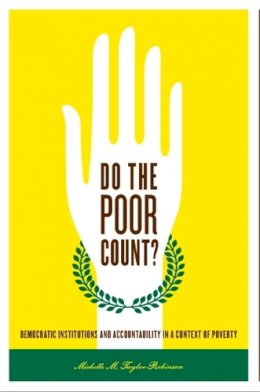17%OFF

Stock image for illustration purposes only - book cover, edition or condition may vary.
Do the Poor Count?: Democratic Institutions and Accountability in a Context of Poverty
Michelle M. Taylor-Robinson
€ 83.27
€ 69.22
FREE Delivery in Ireland
Description for Do the Poor Count?: Democratic Institutions and Accountability in a Context of Poverty
Hardback. Num Pages: 248 pages, black & white tables. BIC Classification: JFFA; JPA; JPHV. Category: (G) General (US: Trade). Dimension: 229 x 152 x 23. Weight in Grams: 454.
Latin America’s flirtation with neoliberal economic restructuring in the 1980s and 1990s (the so-called Washington Consensus strategy) had the effect of increasing income inequality throughout the region. The aim of this economic policy was in part to create the conditions for stable democracy by ensuring efficient economic use of resources, both human and capital, but the widening gap between rich and poor threatened to undermine political stability. At the heart of the dilemma faced by these new democracies is the question of accountability: Are all citizens equally capable of holding the government accountable if it does not represent their interests? ... Read more
Show LessProduct Details
Format
Hardback
Publication date
2010
Publisher
Pennsylvania State University Press United States
Number of pages
248
Condition
New
Number of Pages
248
Place of Publication
Pennsylvania, United States
ISBN
9780271037509
SKU
V9780271037509
Shipping Time
Usually ships in 7 to 11 working days
Ref
99-1
About Michelle M. Taylor-Robinson
Michelle M. Taylor-Robinson is Associate Professor of Political Science at Texas A&M University.
Reviews for Do the Poor Count?: Democratic Institutions and Accountability in a Context of Poverty
“Despite the presence of large—even majority—poor populations in Latin America, democratic institutions and policies frequently do not reflect their interests. Taylor-Robinson’s book presents a thoughtful analysis of the causes of that ‘representation gap.’ She offers a rich institutional account, suggesting that a combination of institutions (electoral, nominations, and clientelistic) leads elected officials to respond differently to their privileged and poor ... Read more
